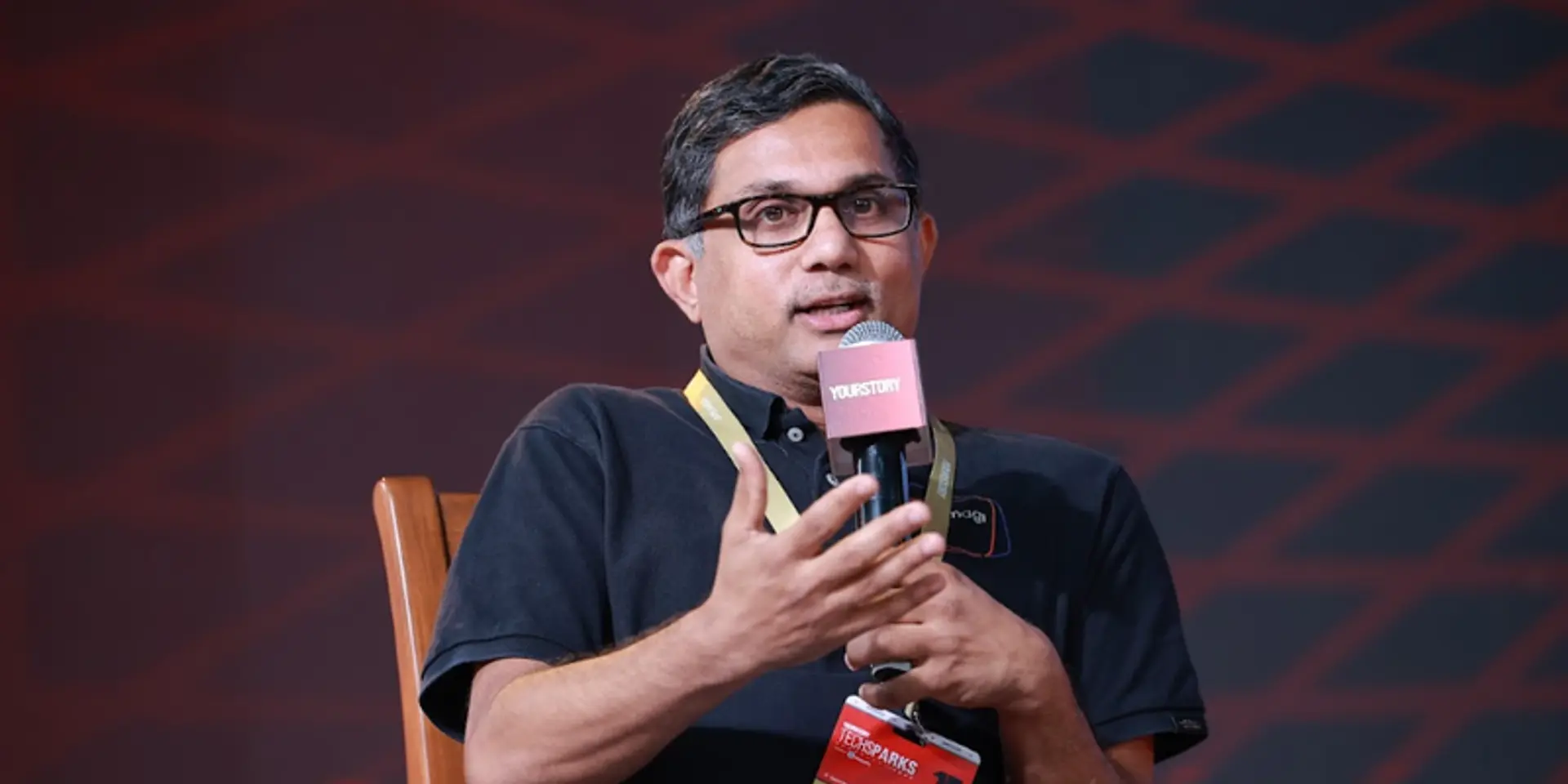India holds the key to global AI development: Amagi’s Baskar Subramanian
Speaking at TechSparks Bengaluru 2024, Amagi CEO Baskar Subramanian underscore India's large pool of AI talent and experts who are leading advancements in the space.
India has the talent pool to play a very large part in the future development of AI at much better cost efficiencies, according to Baskar Subramanian, Co-founder and CEO, Amagi Media Labs.
“AI is a transformative technology. This is exactly where the internet was in the 1990s. It is very early for AI and [it is yet to be seen] how it is going to impact industries. There will be innovations in the future. In India, there’s a lot of talent being developed in the space,” Subramanian noted while speaking at the 15th edition of TechSparks Bengaluru 2024.
In a fireside chat with YourStory Founder and CEO Shradha Sharma, the product-driven tech entrepreneur pointed out that the country is seeing a large pool of subject matter experts who are leading the advancement in the space. “When computer scientists, mathematicians and physicists come together, we can actually get things done. I truly believe there is a big opportunity in front of us. But it is very early to decide who is the winner or loser in this space,” he shared.
Amagi has quietly emerged as one of India’s biggest $100 million annual recurring revenue (ARR) success stories. From setting up cloud-based broadcast solutions to transforming the global media space with large deals with the likes of NBC and Comcast, the profitable company has made a mark. It is also eyeing an IPO in the near future, Subramanian revealed.
“We are looking at an IPO pretty soon... somewhere in the next couple of years, given, I think, we are pretty profitable as a company. To give you context, from half a million dollars in 2016, we are at about $150 million right now,” he said.
The Bengaluru-based media technology provider, which launches, distributes, and monetises live linear channels on ad-supported streaming platforms, was founded by Srividhya Srinivasan, Subramanian, and Srinivasan KA in 2008, who knew each other from their college days. Prior to this, the trio had also co-founded Impulsesoft, which was acquired by Nasdaq-listed SiRF.
Built in India for the world
The media SaaS firm, which started its first service in India with geo-targeted advertising on TV ~12 years ago, now caters to 800+ content brands across 150 geographies, offering cloud broadcasting and targeted advertising solutions for large TV networks and video streaming platforms.
"We started off with wanting to build something very disruptive and for the long term. And obviously, we planned to start from India. So we looked at multiple technologies; television looked exciting and we thought streaming will happen," he notes.
Now, with backers including Emerald Media (exited), Mayfield Fund (exited), and Premji Invest, Amagi caters to NBC Comcast, one of the largest media companies in the world, which decided to move to a virtualised cloud infrastructure with Amagi for all their services.
Some of its other global clientele include A+E Networks UK, ABS-CBN, Cox Media Group, Lionsgate Studio, NBCUniversal, Tastemade, among others. “We are very focused on our customers. I don't look at competition. I truly believe we focus on our customers, build for our customers, listen to our customers, and really differentiate our product lines,” Subramanian said.
Enabling localisation
Back in 2010, Amagi introduced a service that allowed state-wise, language-wise local advertising on Indian TV channels during the cable and satellite era.
"Local advertising [at the time] was radio and print in India. Interestingly, all the TV channels said, we love the technology, but we've never done local advertising. So, we cannot really use the technology. At that moment, we decided that we will build our own advertising sales. We then built a sales company, Ad Sales," Subramanian shared.
They later took the feature to streaming too. "If you're watching an IPL match, you would have different advertising in different parts of the country at the same time. So, if you're watching in Punjab, Delhi, Mumbai or Bangalore, you would have different ads streamed on your device," he stated.
Realising that many advertisers lacked the ability to make creatives for TV ads, Amagi went on to help businesses build the creatives by establishing an in-house studio to produce high-quality TV ads, expanding its offerings beyond just ad placements.
"We have no tech background and started learning new things. In 3-4 years, we had built a fairly large infrastructure of 20,000 locations across the country where you can actually have different advertising. We were buying hundreds of crores of ad inventory from the likes of Colors and Zee TV and others... even advertisers like Unilever, Pepsi and others," Subramanian added.
Fuelling global events
Amagi has fuelled real-time telecast of major global events such as the US elections and the Olympics, resulting in a massive 2.5 billion hours of viewership annually on its platform.
In 2022, the Bengaluru-based firm raised $109 million at a valuation of $1.4 billion. The company secured $80 million in primary capital from global growth equity firm General Atlantic, and the rest through secondary stake sales.
Prior to that, Amagi had also raised $95 million in a funding round led by Accel, with participation from existing investors Norwest Venture Partners and Avataar Ventures, which catapulted into the unicorn club.
The company also has a presence in New York, Los Angeles, Toronto, Mexico City, London, Paris, Sydney, Seoul, Singapore, and broadcast operations in New Delhi, and innovation centers in Bengaluru, Zagreb, and Lódz.
“There is one-tenth or one-hundredth of the opportunity in front of us. We think we would be one the largest media tech companies in the world. We have a fairly good platform and foundation right now. Beyond FAANG, which is the Meta, Apple, Amazon, and Google, we are the largest today,” Subramanian said.

Edited by Jyoti Narayan



